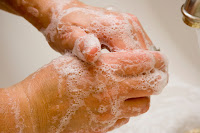-Ask the Expert-
Question:
 Hi, I live with people affected by what I think is a real
sickness: the obsession for cleanliness and hygiene. They are neat freaks!
Hi, I live with people affected by what I think is a real
sickness: the obsession for cleanliness and hygiene. They are neat freaks!
Where does this mania come
from? Why these people have the need of live in excessively clean places?
I
really want to understand it, because their behavior is extremely annoying, for
them it is not enough to live with this obsession, but they want to transmit it
to others in any way possible!
What is the mechanism that creates these
obsessions? What drives them to give importance to things that are objectively
not important? What there is behind all this hygiene need? Thanks for the
answer!
Answer:
According to classic psychiatry it is Obsessive Compulsive
Disorder. The affected subject tries to keep anxiety under control by setting
in motion rituals that, by being repeated in time, give him the illusion of
having everything under control. Obsessive cleanliness and hygiene fulfill the
same need.
The one for cleanliness is one of the most common obsessions
of OCD subjects, even though it is not the only one. It represents a serious
problem of contact and relation with the world and with other human beings, a
problem that involves the sphere of affections and sexuality.
 The symptoms
increase when the subject’s anxiety increase (the symptoms are the way the
subject cope with anxiety.)
The symptoms
increase when the subject’s anxiety increase (the symptoms are the way the
subject cope with anxiety.)
The anxiety/fear typically related to the Obsessive Compulsive Disorder makes the
subject think to be so fragile that any external agent, which is perceived as
dangerous, might damage/kill him. Filth may cause sickness, who is affected by
OCD is almost sure that they will get those sicknesses.
The “need to transmit” these obsessions is a secondary fact:
if others do not follow the ritual, they might damage its efficacy. The fact
that they “give importance to things objectively not important” is irrelevant,
since subjectively they are of VITAL importance.
Answer:
Sergio Scialanca, Psychologist
Question:
Mirko, 40 years old
Publication Date: 03/27/2007
Check out the original article here
No comments:
Post a Comment